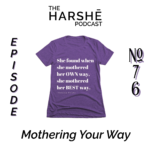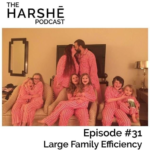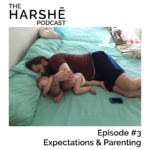
June 2011 ~
She was soft-spoken and smiling, in the coffee shop on Avenue de Gaspé on a summer morning in Montréal. It was the kind of cafe I would have once loved – a little crocheted hanging seat in the corner, lots of glass, a communal table. Coffee boiling in beakers. And she was the kind of woman I would have once been friends with: young, motivated, bright, hip. And childless.
I had been dragged into the cafe by my colleagues (also childless), who needed to caffeinate before our meeting. I was wearing my baby, only four months old and heavy, oh-so heavy, in a homemade sling. He looked like babies do: beautiful, asleep, and thus full of all things calm and reasonable. And then she asked the question I had been warned about. She asked, Is he a good baby?
I lurched. I paused. I stalled.
“Does he sleep through the night?” she asked.
I shrugged. I smiled and said, “He sure is heavy,” or something awkward like that, and our conversation ended on a note that told me that we would never be friends. We would never be friends because things were different in my life now; I couldn’t be seated in a cafe with my laptop and a pair of billowing MC Hammer pants. I was a mom now. And as mother to this particular baby, I wasn’t allowed to sit down. I wasn’t allowed to try clothes on. And what’s more, I had to learn to play the game. To answer the question. How good was he?
The truth is, my son – beautiful, intense, spirited – was not.
I didn’t know how to politely tell her that there are not ‘good’ babies and ‘bad’ babies. That all babies are great! All babies are lovable! All babies deserve love! It’s just that some (some!) babies need more. More what?
More everything. More holding, more rocking, more cradling, better cradling, more nursing, more cooing, more singing, more bouncing, more stroller rides, more car-rides, more nursing, more nursing-during-car-rides, more… You.
There are some babies who will sit quietly by themselves while you make your morning coffee (or have someone make it for you, in a beaker, in a café near a series of artist-run warehouses) and then sit quietly while you drink it. There are some babies who sleep through the night (for four or more hours, without waking up!). All this without resistance, without coercion, just… out of their own infantile will.
My baby was not one of them. He was the kind who needed more than I ever thought I could give. He needed near constant movement, for example. He needed so much suckling that my milk didn’t regulate until he was 12 months old. He is now 3.5 years old and he still needs significant night-time parenting.

The thing I wish someone had told me is that, while my babe would never be hired to star in a diaper commercial; while I couldn’t see straight for the exhaustion; and although his part-time daycare provider had canceled on me four times in a row, like maybe she was trying to tell me something, there are benefits to having a high-needs baby. There is a light at the end of the tunnel, and I don’t just mean the terrible twos.
So, to all the parents up late googling “high-needs baby” and “is this even possible what happened to my life”, this is for you: five benefits of having a high-needs baby.
1. Physical fitness. Are you worried about getting your pre-baby body back?* Having a high-needs baby will make your body strong. I’m talking about muscle, endurance, cardio. My son needed to be carried almost constantly for the first year of his life. He was 17 lbs at three months. I wore him in a carrier up to 8 hours/day. I don’t know how many calories that is (and I was eating a lot of ice-cream at the time), but it was certainly more exercise than I’d had in years.
*This is a joke. I would never say that, I vandalize posters that use these words with a permanent marker and the question, But where did it go?!.
2. Compassion. When you feel the ache in your body after two hours of horizontal bouncing, your mouth dry from shushing, your bladder full to bursting from that hell that is “lying down beside baby and staying very, very still for a very, very long time because if he wakes up you will both start crying,” you start to think, This is craziness. Why would anyone do this? Has anyone ever done this before? And the answer you might come to is: Yes. Your parents, maybe. You were the squalling baby they poured their love into. Suddenly, that time your mom yelled at you for stealing a cookie is much easier to understand.
3. Preparation. Having a high-needs baby prepares you for having a demanding toddler, a spirited kid, a superlative adolescent, a well-adjusted adult… well, a mom can dream. A dear friend of mine had an easy baby who turned into a spirited toddler and it was a tough transition. “My first born was an easy baby,” she wrote to me in an email, “…he was content most of the time and easily soothed by baby wearing or his swing. He didn’t really want a lot of stimulation or help with his playtime, content to sit and look at a baby book or sort through his toys. Then it seemed like almost overnight he became extremely high energy and high needs. I had to spend all my energy trying to keep him busy in constructive ways or a meltdown would ensue. Once my second child came along I fully realized exactly how much energy I put towards keeping him at an even keel because now I couldn’t focus just on him.” If you’ve been dealing with high emotionality and intense physical needs from day 1, you will expect nothing less on day 706.

4. Health Insights. Many high-needs babies are in fact babies in pain. The mainstream medical establishment is notorious for brushing off the concerns of parents of screaming babies (as our pediatrician told me, “We want to hear screaming, that means they are healthy”). Parents, traumatized and desperate, often turn to alternative therapies and treatments. Alternative doctors are more likely to listen to patients’ needs and give them a safe space to talk about their harrowing experience which is important for health outcomes and psychological survival. And sometimes, as with my friend who took her daughter to a naturopath she now calls a “miracle worker,” or another who brought her daughter to the chiropractor several times a week for a suspected hiatal hernia, it works. The more tools in your self-care toolbox, the better. Learning about your body – and you’re baby’s body – is a good thing.
5. Commiseration. You can connect with other parents of high-needs babies much better. My parents had two babies. The first was easy. The second was tough. Really, really tough. My mother is deaf in one ear from the baby’s screaming. They learned that their “easy” first baby was simply a matter of luck. The props other people had given them, the looks of admiration and the advice-seeking from other families — all of it was mistaken. This is the understanding you get when you have a high-needs child: that you are not a perfect parent. And that parents with “easy, good” babies are not perfect parents either. Yes, there’s lots you can try to calm a child and much you could do to make them fussy. But a crying baby is not an indication you’re doing something wrong. It’s an indication that you need a piece of chocolate and a hug. Fact.
~
Keep on truckin’, mamas. And thank you for the gift you are giving by raising a high-needs baby with all the understanding and compassion you can muster. Your baby is not “good” but your baby is essentially himself/herself. Babies like him/her become the people the world needs: people with a fire in their bellies and a firm footing in love. Your baby is not “good.” Your baby is perfect. And your baby will change the world.










7 Comments
Amie
Thank you for sharing your story! My first born was the mellow easy going baby and toddler but my youngest came along and she sure beats to a different drum! It’s nice to relate..
Megan
Thank you.
Theresa H
Thank you for this!! Oh man, sometimes it seems like everyone has it easy and it is hard not to feel like there is something that I must be missing. Beautifully written and an awesome reminder, off to snuggle my perfect little ones. x0
Susan
Thank you so much for this! My first, now 15 months old, is intense, spirited, ultra alert, sensitive, extroverted, HIGH energy, and wonderful. I spent the first 8 month of her life listening to a well meaning friend who INSISTED that nurture completely overrides nature and that I was causing my child’s high sensitivity and high neediness by being “such a first time mom”. I no longer listen to that well meaning friend, she simply does not get it, and I try not to hold it against her. Instincts are important with these incredible little ones, and dealing with your own insecurities and expectations in addition to whatever is left over from your childhood is so necessary. Thank you so much for writing about the spirited ones, we need the resources to not feel isolated and discouraged
Vg
I really appreciate ur comment.
Jessy
So nice to know I’m not the only one and that it’s not something I’m doing!
Rasee
Absolutely love this. My daughter is definitely a high-need kiddo and we spent the first year breastfeeding almost constantly and we didn’t sleep through the night until she was two. She is still intense at 3.5, but oh, what a special, wild, ridiculous, amazing child she is. I am so glad I followed my heart and didn’t give up breastfeeding when everyone told me she was obviously not getting enough or go through sleep training when everyone told me that some babies just need to cry it out. I’ve followed my instinct every step of the way and she has always, always proven me right. We’ve got this.